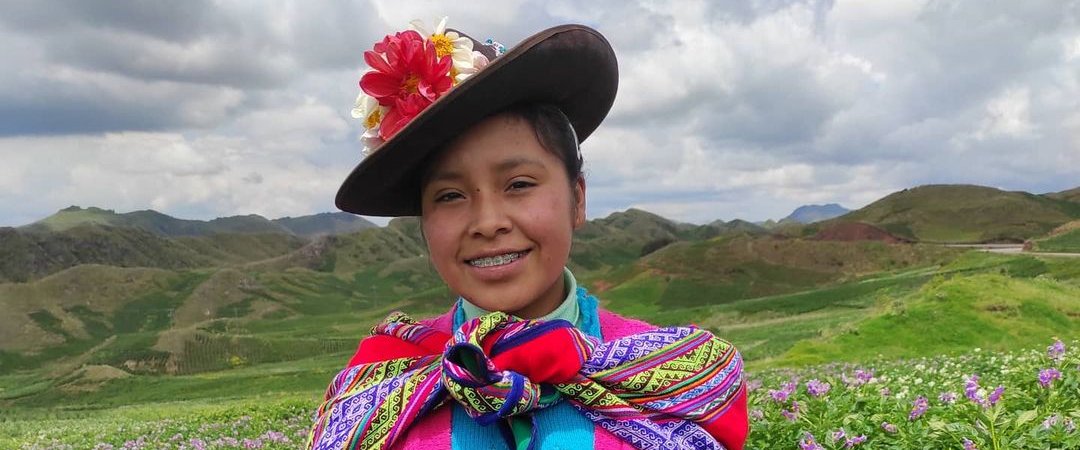Meet the first indigenous content creator form the Andes: Soledad Seca

August holds profound significance in the communities of the Sacred Valley. As the Inca calendar welcomes a new year, the valley buzzes with the anticipation of agricultural rejuvenation. It’s a period symbolic of rebirth for local communities, where predictions about future harvests and farming tasks take centre stage.
We travelled in the verdant expanse of Moray’s Sacred Valley in Peru, where MIL restaurant and Mater Iniciativa research centre are at 3,500 meters.
Mater Iniziativa, for a decade, has been operating at the crossroads of exploring the vast cultural, natural, agricultural, and social aspects of the Andes, being in close contact with the neighbouring native communities. Mater is also a hub hosting multidisciplinary artists and international academic research groups exploring the Andean natural and social landscape, forgotten food preservation traditions, and antique cooking techniques. This August, we encountered a design collective, Cocina Salterinas, hosted by Mater for a 4-week residency. During their time here, the duo traveled to the native communities to discover their ancestral practices in the fields during the dry season. To accompany Cocina Salterinas was Soledad Secca, a young indigenous woman from the Occopata community, an anthropology student, and a content creator who assisted in communication in the native Quechua language, widely spoken in the Andean communities.
Our meeting with Soledad Seca at the Mater office in Moray was spontaneous, and we couldn’t resist discovering more about her being the first indigenous Quechua content creator. The place Soledad grew up is in the district of Santiago in Cuzco, 4,000 meters above sea level, and has approximately only 900 inhabitants.
She states that her dream was initially to bring awareness about her people to the world, to see her family and colleagues from Occopata on local television, to make others understand their lifestyle, to fight the marginalisation of the indigenous people, to celebrate their culture from the dressing style and food culture to the essential part, their work with the native potato cultivation, as the most families are dependent on agriculture, both for sale at the market and for personal consumption.
She started sharing simple videos about the daily life of Occopata back in 2020, during the pandemic, with the first post stating, «Today, I am part of Occopatiña from my rural community of Occopata. I feel grateful and honored to belong to an ancient culture».
Nowadays, her following base counts 80K on Instagram and 32.6K on YouTube, with followers worldwide. From the beginning, for Soledad, speaking in her native Quechua language was important to stay true to her roots. She would show scenes from a potato harvest, explaining local traditions like #huaita (brick earth oven made to cook the potatoes underground) or #chuño (the dehydration process of the potato).
Growing up in the Occopata community, Soledad shares that in her family, she’s the only one who had the opportunity to study at a university, currently being an anthropology student. Nowadays, indigenous populations still have low opportunities to access higher education; as stated by UNESCO, 66.6% of the urban population completes upper secondary education compared to just 46.4% in rural areas. The indigenous population presents high levels of educational exclusion. The rest of her family had been able only to finish school, as young women face obstacles to a higher education and start a family instead.
Considering the high levels of poverty that force some indigenous people to move to urban areas and have at risk of extinction the traditional cultures and practices, for Soledad, it’s also a question of using her platform for tangible help.
In one of her latest videos, Soledad appeared with a community member inviting followers to support and acquire native potatoes directly from them. Notably, the comments people left reflected solidarity and understanding: “It is a luxury to be in the countryside, the varieties, the flavors, that we don’t have in Europe, so if you can buy products like potato directly with from, do it! The price is cheap; let’s appreciate what we have and help the people in the countryside!».
In every video she creates, whether she’s brewing barley mate with her grandmother Satuka, demonstrating how to make traditional uchukuta sauce, or sharing her method of chewing coca leaves to alleviate stomach pain, her content consistently emphasizes a central theme. She underscores the importance of preserving indigenous knowledge with a smile and heartfelt sincerity. Her message is clear: safeguarding these traditional practices is crucial for the health of the world’s ecosystems and supporting indigenous peoples’ livelihoods. This perspective is woven throughout her videos, showcasing how her community collaboratively manages each stage of potato production and more while highlighting these practices’ simplicity and significance.
Above them is also the climate change effect on the community’s life. In contrast, the communities are extremely vulnerable parts of society to the effects of global warming; nevertheless, they possess a wealth of knowledge about how to handle climate variability.
